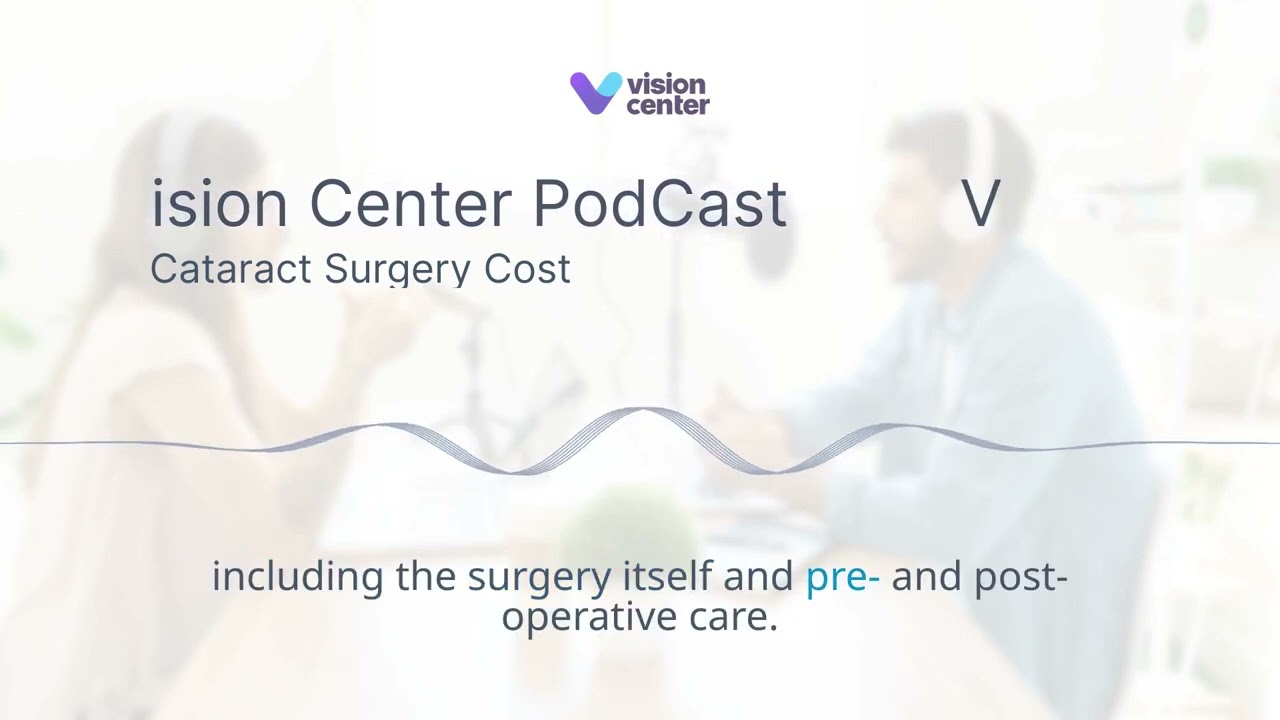Without treatment, cataracts can lead to significant vision loss and even blindness. However, plenty of people have concerns about the cost of treatment.
While cataract surgery can be costly, there are ways to lower the overall price. This guide simplifies understanding cataract surgery fees, insurance coverage, and your potential out-of-pocket expenses.
How Much Does Cataract Surgery Cost?
The average cost of cataract surgery in the U.S. ranges between $3,500 and $7,000 per eye for uninsured people.
Listen In Q&A Format
Cataract Surgery Cost
Vision Center Podcast
However, Medicare and private insurance plans often cover all or a portion of the costs, potentially reducing your out-of-pocket expenses by 80% or more.
Why is Cataract Surgery So Expensive?
Cataract surgery can cost a significant amount of money because there are several components that influence the total cost. These include:
- Professional fees. This covers your ophthalmologist’s expertise, averaging around $750 per eye.
- Type of surgery. Traditional surgical techniques, such as phacoemulsification, are lower in cost. Laser cataract surgery is the most expensive due to the advanced technology it uses.
- Facility. Ambulatory Surgery Centers (ASCs) average around $1,062 per eye, while Hospital Outpatient Departments (HOPDs) typically charge about $2,120—almost double due to higher overhead and staffing expenses.
- Anesthesia. Fees generally range from $130 to $250 per eye and often are bundled with surgeon or facility charges.
- Type of lens. Medicare and most insurance plans fully cover the cost of a standard intraocular lens (IOL). Premium lenses can be more expensive.
- Pre and post-operative care. Your surgical package typically includes 90 days of postoperative follow-up visits.
Additional Costs
Aside from surgery fees, cataract surgery can lead to more expenses down the line, including:
- Post-operative eye drops. Typically cost $100 to $300 if uninsured; generics and compounded options can reduce costs.
- Secondary procedures. Some people may need a YAG laser procedure within 1 to 5 years, costing around $300 to $500 without insurance.
- New prescription. After surgery, new glasses may be needed, costing $100 to $400.
- Tax deductions. Medical expenses exceeding 7.5% of adjusted gross income (AGI) may be tax-deductible, potentially reducing your annual tax liability.
Long-term, cataract surgery can reduce expenses associated with injuries and repeated eyewear purchases, providing financial benefits alongside clearer vision.
Does Medicare Cover Cataract Surgery?
Yes, Medicare typically covers 80% of the expenses related to cataract surgery. However, the surgery must be medically necessary to receive these benefits.
Most cataract surgeries don’t require you to stay overnight, but if yours does, hospital stays and other inpatient procedure costs are covered by Medicare Part A.
Meanwhile, Medicare Part B covers medically necessary healthcare procedures and services. Part B will cover:
- Pre-surgery appointments
- The surgical procedure
- Monofocal lenses
- Post-surgery outpatient services
How Does Medicare Work for Cataract Surgery?
Medicare generally pays 80% of the approved surgical charges after you meet your annual Part B deductible ($257 in 2025). You pay the remaining 20%.
For example, if Medicare approves $2,000 total, your portion is about $400 per eye after the deductible. Medigap (supplemental insurance) helps cover your remaining costs:
- Plans A, B, D, G, M, and N typically cover 20% coinsurance after the deductible.
- Plans K and L partially cover coinsurance (Plan K covers 50%, Plan L covers 75%).
- Plans C and F cover both deductible and coinsurance fully for those eligible.
Does Private Insurance Cover Cataract Surgery?
Most private health insurance providers consider cataract surgery to be medically necessary. Therefore, they will cover at least a portion of the associated costs.
Insurance providers who cover a significant portion of your cataract surgery include:
- Cigna
- Aetna
- United Healthcare
Speak directly with your healthcare provider to find out what your plan covers.
Using FSAs and HSAs to Pay for Cataract Surgery
A Flexible Spending Account (FSA) allows you to pay for many medical expenses using pre-tax income from your employer. An FSA cannot exceed $3,300 annually, but that amount might be lower depending on your employer.
Meanwhile, a Health Savings Account (HSA) is a tax-exempt account designed to help pay or reimburse qualified medical expenses. However, you must meet certain eligibility requirements for an HSA, including:
- Being enrolled in a high-deductible health plan (HDHP).
- Having no other health coverage, including Medicare.
- No one can claim you as a dependent on their tax return.
Unlike an FSA, unspent money in an HSA rolls over at the end of the year. This allows you to potentially save enough money to cover the full cost of cataract surgery over one or more years.
In this article







